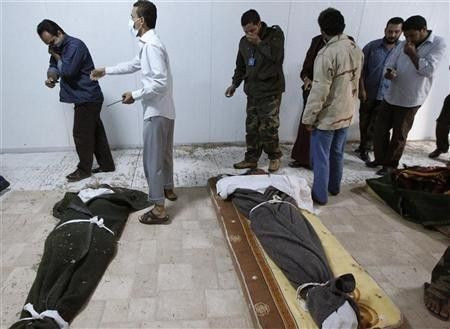Libya ends public showing of Gaddafi's body

Libya's interim rulers ended the public display of the bodies of Muammar Gaddafi, his son and army chief on Monday after four days in which thousands of Libyans came to see for themselves that the dictator was really dead.
Guards locked the gates to the compound surrounding the cold storage container where the grim parody of the lying in state typically accorded to deceased leaders had been played out.
That may signal a decision is near over how and where to bury the bodies or simply that they are seen as a health hazard. Two National Transitional Council (NTC) officials confirmed the decision to shut off the area to the public, giving no reason.
That's enough, said one of the guards. He's been causing us as much trouble dead as he did alive.
A steady stream of visitors filed in to view the spectacle on Monday before the closure, but far fewer than on previous days when crowds flocked to the container where the three rotting bodies were laid out on filthy mattresses.
There were still a handful disappointed however.
Can I just bring my son in? one old man pleaded.
No, we're closed, the guard replied angrily.
Later, fresh guards came on duty and allowed about 100 people to see the bodies then shut the gates once again.
Fighters guarding Gaddafi's darkening body and that of his son Mo'tassim and his former army chief had placed plastic sheeting under them as fluids leaked into the market cold store in Misrata where they had been taken after their capture and killing near Gaddafi's home town of Sirte on Thursday.
With the door constantly opening to allow a procession of onlookers, the refrigeration unit failed to stop rapid decomposition. Guards handed out surgical face masks against the stench and had sprayed disinfectant over the corpses overnight.
Gaddafi and his son died after being captured, wounded but alive -- some of their final moments captured on video.
But few Libyans are troubled about either how they were killed or why they were exposed to public view for so long. Islamic tradition dictates burial within a day.
God made the pharaoh as an example to the others, said Salem Shaka, visiting the bodies earlier on Monday. If he had been a good man, we would have buried him.
But he chose this destiny for himself.
Another man, who said he had driven 400 km (250 miles) to see the bodies, said: I came here to make sure with my own eyes ... All Libyans must see him.
DISPUTE OVER BURIAL
The killing of fallen autocrats is far from a novelty -- in Europe in living memory, similar fates befell Nicolae Ceausescu in Romania in 1989 and Benito Mussolini, who had created modern Libya as an Italian colony a decade before he died in 1945.
However, some of the anti-Gaddafi rebels' foreign allies have expressed disquiet about the treatment of Gaddafi both after his capture and after his death and worry that Libya's new leaders will not uphold their promise to respect human rights.
The burials have been held up by wrangling between the emerging factions within the National Transitional Council over where they should be interred. NTC leaders want Gaddafi buried at a secret location so the place does not become a shrine.
Gaddafi's tribe, centred on the city of Sirte where he made his last stand, has asked for the body so they can bury it there. Gaddafi requested to be buried in Sirte in his will.
There are different views, said an NTC official in Misrata. Some people want them buried in the invaders' cemetery in Misrata, he said, referring to a place outside the city near the sea where hundreds of fallen Gaddafi fighters have been buried with some dignity and respect.
Some people want to hand them over to his tribe, but we have some demands. Many people have been kidnapped and killed by people in Sirte since the 1980s. We asked them to give those bodies back. Since then they have been quiet, said the official who asked not to be named.
NTC head Mustafa Abdel Jalil said the council had formed a committee to decide the fate of Gaddafi's corpse and would follow guidance from Libya's religious authorities.
The official Egyptian news agency said Libya's office for fatwas, or religious decrees, had declared Gaddafi was not a Muslim as he had denied the teachings of Prophet Mohammad and so should not be given an Islamic funeral.
© Copyright Thomson Reuters 2024. All rights reserved.





















